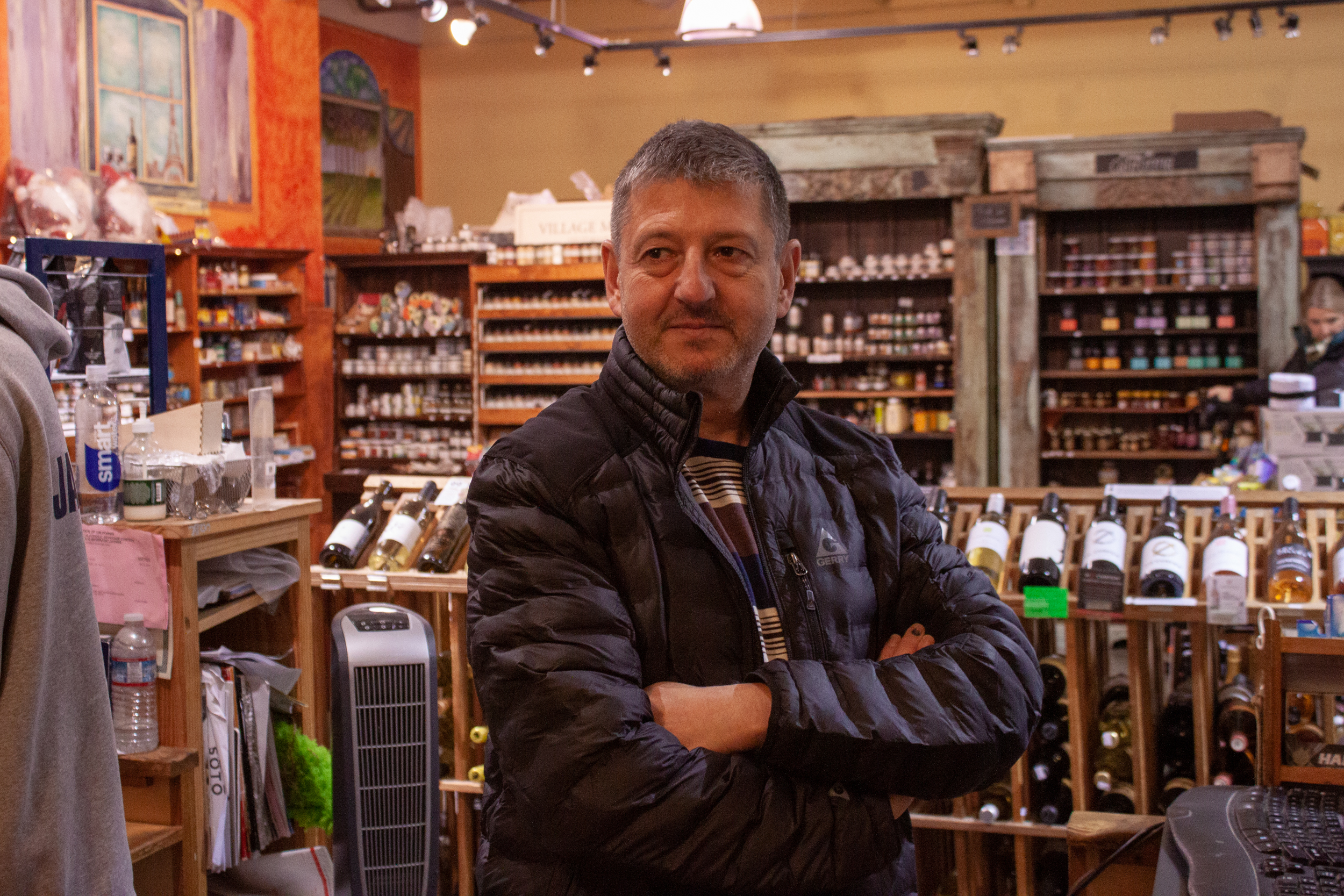A plan to remove cars from the Embarcadero is brewing, but business owner's reactions to the idea have been mixed.
“I’m going to shoot myself from these ideas,” said Bob Mudawar, who has run the Village Market inside the Ferry Building since 2003.
Mudawar does deliveries to his store using his car, and said not being able to drive along the Embarcadero presents significant challenges in keeping his shelves stocked.
“When I need things shipped or need to do deliveries, I drive. It doesn’t work on a bike,” Mudawar said.
Activists Alex Soble and Stacey Randecker are leading the effort to take cars off the Embarcadero, which runs from Oracle Park to Fisherman’s Wharf.
A preliminary illustration they created and showcased on their website about the plan designates space for outdoor dining and wide sidewalks on each side of the waterfront, along with two-way bike lanes and two tracks for Muni trains straddling a 15-foot-wide boarding island.
The train tracks and bike lanes would be separated by planters, which would run roughly 3-mile the length of the street, and the illustration shows a 10-foot space for food trucks next to the sidewalk near the water.
Haley Atchison, front-of-house manager at waterfront sushi restaurant Ozumo, was more intrigued by the plans. Atchison said that the street closure could boost foot traffic passing by the restaurant and allow it to open up more outdoor dining spots facing the water.
“The Embarcadero is the most requested dining area,” Atchison said. “If all traffic was gone, it would give it a totally different vibe.”
But other restaurant owners felt differently.
“I’m not for it,” said Brett Maurice, general manager of Fog City, formerly known as Fog City Diner.
Maurice said that the area doesn’t have enough transit service for people to easily access his restaurant without cars, particularly older customers.
“I just think it’s going to make it harder for people to get down here. Not everyone lives in the city,” Maurice said.
Several people walking along the waterfront Monday said they were perplexed by the idea.
“It sounds crazy. Where is the traffic gonna go?” said Andy Decker, who has lived in San Francisco for 30 years and works in the Financial District.
San Francisco resident Bara, who declined to give her last name, said she didn’t see the point of taking the cars away.
“I don’t think it makes sense,” Bara said. “The Embarcadero already has a wide pedestrian access.”
Her fiance, Jan, on the other hand, was more gung-ho for an Embarcadero closed off to cars.
“No cars, make it a community thing,” said Jan, who declined to give his full name. “Add bike sharing, add more public transportation.”
The Czech native pointed out that in Europe car-free streets are far more common. He said better public transportation helps European cities' car-free streets thrive.
Randecker and Soble said that taking cars off the Embarcadero is a chance to bring more open space to residents of the city’s dense east side.
“The west side has Golden Gate Park; people have backyards,” Randecker said. “This area has the densest housing. They need more space.”
The city’s western neighborhoods also have car-free streets, most notably the Great Highway near Ocean Beach and John F. Kennedy Drive in Golden Gate Park, as well as several Slow Streets that limit traffic, particularly in the Richmond.
Soble said a car-free Embarcadero could provide a boost for businesses along the waterfront. He hopes the plan will improve local air quality, pointing to efforts throughout Europe to reduce car use, including Barcelona’s speed limit decrease and cutting of street parking.
“Now is the time to change the waterfront so we can reduce our carbon emissions,” Soble said.
The plan has also garnered support from politicians, with Assemblymember Matt Haney and State Sen. Scott Wiener weighing in with their support of the idea of a car-free Embarcadero, although Wiener shared concerns about the impact on businesses with SFGate.
‘Bay Area people don’t take public transit’
Randall Scott, head of the Fisherman’s Wharf Community Benefit District, said that closing off the waterfront to car traffic would cut into business at Fisherman’s Wharf, a long-standing tourist attraction.
“Tourists and Bay Area people don’t take public transit; they take cars,” Scott said in a phone interview.
Scott had also told SFGate, which first reported the car-free plan, that closing a “major traffic artery” would severely impact the economic health of Fisherman’s Wharf.
The Port Commission also raised concerns about how waterfront businesses along a car-free Embarcadero would receive deliveries or how the plan would affect the city’s disaster response, which requires large vehicles to access areas of the port.
“The port has not been approached about the idea; however, from what we have read, we have significant concerns about the impacts it might have on the port and port tenants operations,'' said Boris Delepine, the port's legislative affairs manager.
Randecker and Soble said they are in the initial stages of outreach and plan to connect with local businesses. They have already reached out to Scott, according to Randecker.
“We’re in the beginning process of that,” said Randecker, who said they wanted to find “common ground” between them and the community benefit district.
Scott said that he is open to discussions with Randecker and Soble, and that he hopes to find a way to maintain a car-free zone along the waterfront while maintaining private vehicle access.
“My philosophy is let’s find a way to share the Embarcadero,” Scott said.
